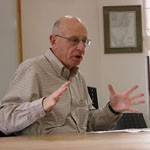
JERUSALEM — For more than a year, Israelis have gone to the polls three times. On each occasion, they have produced a tie, more or less, between the major blocs. With neither one able to form a government.
Now we’re on the verge. This week Likud and Blue and White are scheduled to install a government, scheduled to last for four and one half years.
Bibi will be Prime Minister for a year and one half; then Gantz for a year and one half; then Bibi; then Gantz.
The Supreme Court has approved the deal.
We’ll see if it holds together.
Currently we’re wondering who’ll become their ministers. They’ve agreed on an equal split, but we’ll see how that works in practice. There’s been some muddling about trading between Gantz and Likud, such as one major ministry for two minor ones. And comments from Blue and White that they will not appoint all they are entitled to, in order to keep the total below the fantastic numbers agreed.
The right wing party, Yamina, headed by Naftali Bennett, is wondering if it’ll get any ministries. Bennett has said, on television, that he’d welcome the Health Ministry, but so far hasn’t been invited. He’s also asking for three ministries for his party, quite a bit for a party with only six seats in the Knesset.
If the major parties go all the way they’ve agreed, there’ll be some appointed to fictional ministries, meant to provide jobs to the boys and girls, each getting a car, driver, title, salary, and aide, but without serious work. In this manner there might become a Minister for the Galilee, and a Minister for the Negev, plus a few other artful titles.
It is also clear from our experience with Coronavirus that who is the minister has limited impact.
For the most part, it’s the professionals who make the crucial decisions, often covered by agreements by their minister.
The Health Minister has been absent, except for some high-profile indications of influence in taking care of ultra-Orthodox interests, such as opening the mikvaot, and delaying, for short times, impacts of closures on their communities.
The Prime Minister has been prominent as a spokesman, and perhaps umpiring conflicts between professionals in the Health and Finance Ministries, plus coming down on the specifics of what is said to be policy.
As we see below, however, he hasn’t done much to avoid the confusion in details.
It helps that we don’t have a madman at the top, like Donald Trump. His (joking?) advice to swallow bleach, and numerous efforts to replace advisers hasn’t helped. Also affecting the American response is a federal system that provides considerable authority to state governments. Their governors are making efforts to be seen in charge, by deciding prominent issues of opening or closing freedoms to work and moving around.
Ours is a much more centralized system, with a professional cadres of administrators who argue among themselves and leave key decisions to the Prime Minister. But not leaving out the considerable chaos of multiple decisions coming from different agencies; not thought out as they actually may limit the ways that teachers, health personnel, and citizens can respond.
There’s also a lot of confusion as we wind down from closures and lock outs concerned with Coronavirus.
The Ministry of Health has issued lots of requirements for the opening of malls, gyms, markets, school rooms, and kindergartens. They concern numbers permitted, distances between people, testing of those entering, and masks.
Nursery schools are limited to less than half those previous attending, with split shifts, and trading between shifts from week to week. Thousands of children have been informed that there is no place for them in their previous nursery school, with parents complaining about all, and wondering to what extent the requirements will be met from school to school.
The university gym has opened, but with its own rules about how many can be accommodated at one time, and a requirement that the changing rooms will not be available. So I guess we’ll have to make telephone arrangements in advance, and come dressed as we exercise.
If we bother to go at all.
Seems better to exercise by walking the neighborhood. One route includes a steep climb up a hill, and a total walk of one hour. Another includes a climb of more than 80 steps, and a continuing walk that consumes three quarters of an hour. All times assuming that we don’t encounter friends on the way, and chat while keeping a distance of two meters. With masks.
We usually do both each day.
Lag B’omer is upon us. It translates as the 33 rd day of the Omer, which begins with Passover and ends with Shavuot. It’s customary to light bonfires, and for the ultra-Orthodox to congregate in their thousands at the grave of Rabbi Simeon ben Yohai on Mount Harmon. He was prominent in the second century, with numerous miracles attributed to him.
In light of Coronavirus, there are efforts to limit or eliminate the burnings, and to prohibit the congregation on Mt Harmon. And insofar as it’s a school holiday, there’s a quarrel with the teachers’ organizations about cancelling the vacation in the midst of limited teaching. It’s all been ugly, without a clear outcome.
Stay healthy. And sane.
*
Ira Sharkansky is professor emeritus of political science at Hebrew University. He may be contacted via ira.sharkansky@sdjewishworld.com